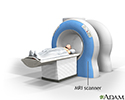Heart failure - tests
CHF - tests; Congestive heart failure - tests; Cardiomyopathy - tests; HF - testsThe diagnosis of heart failure is made largely on a person's symptoms and a physical exam. However, there are many tests that can help give more information about the condition.
Heart failure
Heart failure is a condition in which the heart is no longer able to pump oxygen-rich blood to the rest of the body efficiently. This causes symptom...

Echocardiogram
An echocardiogram (cardiac echo) is a test that uses sound waves to create a moving picture of the heart. The picture is much more detailed than a plain x-ray image.
Echocardiogram
An echocardiogram is a test that uses sound waves to create pictures of the heart. The picture and information it produces is more detailed than a s...

This test helps your health care provider learn more about how well your heart contracts and relaxes. It also provides information about the size of your heart and how well the heart valves are working.
An echocardiogram is the best test to:
- Identify which type of heart failure (systolic, diastolic, valvular)
- Monitor your heart failure and guide your treatment
Heart failure can be diagnosed if the echocardiogram shows that the pumping function of the heart is too low. This is called an ejection fraction. A normal ejection fraction is 55% to 70%. Some people have heart failure with a normal ejection fraction.
If only some parts of the heart are not working correctly, it may mean that there is a blockage in the artery of the heart (coronary artery) that delivers blood to that area.
Other Imaging Tests
Many other imaging tests may be used to look at how well your heart is able to pump blood and the extent of heart muscle damage.
You may have a chest x-ray done in your provider's office if your symptoms suddenly become worse. However, a chest x-ray cannot diagnose heart failure.
x-ray
A chest x-ray is an x-ray of the chest, lungs, heart, large arteries, ribs, and diaphragm.

Ventriculography is another test that measures the overall squeezing strength of the heart (ejection fraction). Like an echocardiogram, it can show parts of the heart muscle that are not moving well. This test uses x-ray contrast fluid to fill the pumping chamber of the heart and evaluate its function. It is often done at the same time as other tests, such as coronary angiography.
Ventriculography
Nuclear ventriculography is a test that uses radioactive materials called tracers to show the heart chambers. The procedure is noninvasive. The ins...

MRI, CT, or PET scans of the heart may be done to check how much heart muscle damage is present. It can also help determine the reason for a patient's heart failure.
MRI
Heart magnetic resonance imaging is an imaging method that uses powerful magnets and radio waves to create pictures of the heart. It does not use ra...

CT
A computed tomography (CT) scan of the heart is an imaging method that uses x-rays to create detailed pictures of the heart and its blood vessels. Th...

PET scans
A heart positron emission tomography (PET) scan is an imaging test that uses a radioactive substance called a tracer to look for disease or poor bloo...
Stress tests are done to see whether the heart muscle is getting enough blood flow and oxygen when it is working hard (under stress). Types of stress tests include:
-
Nuclear stress test
Nuclear stress test
Nuclear stress test is an imaging method that uses radioactive material to show how well blood flows into the heart muscle, both at rest and during a...
 ImageRead Article Now Book Mark Article
ImageRead Article Now Book Mark Article -
Exercise stress test
Exercise stress test
An exercise stress test is used to measure the effect of exercise on your heart.
 ImageRead Article Now Book Mark Article
ImageRead Article Now Book Mark Article -
Stress echocardiogram
Stress echocardiogram
Stress echocardiography is a test that uses ultrasound imaging to show how well your heart muscle is working to pump blood to your body while you exe...
 ImageRead Article Now Book Mark Article
ImageRead Article Now Book Mark Article
Your provider may order a heart catheterization if any imaging tests suggest that you have narrowing in one of your arteries, or if you are having chest pain (angina) or a more definitive test is desired.
Heart catheterization
Cardiac catheterization involves passing a thin flexible tube (catheter) into the right or left side of the heart. The catheter is most often insert...

Blood Tests
Several different blood tests can be used to learn more about your condition. Tests are done to:
- Help diagnose the cause for and monitor heart failure.
- Identify risk factors for heart disease.
- Look for possible causes of heart failure or problems that may make your heart failure worse.
- Monitor side effects of medicines you may be taking.
Blood urea nitrogen (BUN) and serum creatinine tests help monitor how well your kidneys are working. You will need these tests regularly if:
Blood urea nitrogen
BUN stands for blood urea nitrogen. Urea nitrogen is what forms when protein breaks down. A test can be done to measure the amount of urea nitrogen ...

Serum creatinine
The creatinine blood test measures the level of creatinine in the blood. This test is done to see how well your kidneys are working. Creatinine in t...

- You are taking medicines called ACE inhibitors or ARBs (angiotensin receptor blockers)
- Your provider makes changes to the doses of your medicines
- You have more severe heart failure
Sodium and potassium levels in your blood will need to be measured on a regular basis when there are changes made for some medicines including:
Sodium
The sodium blood test measures the concentration of sodium in the blood. Sodium can also be measured using a urine test.

Potassium levels
This test measures the amount of potassium in the fluid portion (serum) of the blood. Potassium (K+) helps nerves and muscles communicate. It also ...

- ACE inhibitors, ARBs, or certain types of water pills (amiloride, spironolactone, and triamterene) and other medicines that can make your potassium levels too high
- Most other types of water pills, which can make your sodium too low or your potassium too high
Anemia, or low red blood cell count, can make your heart failure worse. Your provider will check your CBC or complete blood count on a regular basis or when your symptoms become worse.
CBC or complete blood count
A complete blood count (CBC) test measures the following:The number of white blood cells (WBC count)The number of red blood cells (RBC count)The numb...

References
Greenberg B, Kim PJ, Kahn AM. Clinical evaluation of heart failure. In: Felker GM, Mann DL, eds. Heart Failure: A Companion to Braunwald's Heart Disease. 4th ed. Philadelphia, PA: Elsevier, 2020:chap 31.
Heidenreich PA, Bozkurt B, Aguilar D, et al. 2022 AHA/ACC/HFSA guideline for the management of heart failure: a report of the American College of Cardiology/American Heart Association Joint Committee on clinical practice guidelines. J Am Coll Cardiol. 2023;81(15):1551. PMID: 35379503 pubmed.ncbi.nlm.nih.gov/35379503/.
Kramer CM, Dilsizian V, Hagspiel KD. Noninvasive cardiac imaging. In: Goldman L, Cooney KA, eds. Goldman-Cecil Medicine. 27th ed. Philadelphia, PA: Elsevier; 2024:chap 44.
Mann DL. Management of heart failure patients with reduced ejection fraction. In: Libby P, Bonow RO, Mann DL, Tomaselli GF, Bhatt DL, Solomon SD, eds. Braunwald's Heart Disease: A Textbook of Cardiovascular Medicine. 12th ed. Philadelphia, PA: Elsevier; 2022:chap 50.
Rogers JG, O'Connor CM. Heart failure: epidemiology, pathobiology, and diagnosis. In: Goldman L, Cooney KA, eds. Goldman-Cecil Medicine. 27th ed. Philadelphia, PA: Elsevier; 2024:chap 45.
-
Cardiac catheterization - illustration
Cardiac catheterization is used to study the various functions of the heart. Using different techniques, the coronary arteries can be viewed by injecting dye or opened using balloon angioplasty. The oxygen concentration can be measured across the valves and walls (septa) of the heart and pressures within each chamber of the heart and across the valves can be measured. The technique can even be performed in small, newborn infants.
Cardiac catheterization
illustration
-
MRI scans - illustration
MRI stands for magnetic resonance imaging. It allows imaging of the interior of the body without using x-rays or other types of ionizing radiation. An MRI scan is capable of showing fine detail of different tissues.
MRI scans
illustration
-
CT scan - illustration
CT stands for computerized tomography. In this procedure, a thin X-ray beam is rotated around the area of the body to be visualized. Using very complicated mathematical processes called algorithms, the computer is able to generate a 3-D image of a section through the body. CT scans are very detailed and provide excellent information for the physician.
CT scan
illustration
-
Cardiac catheterization - illustration
Cardiac catheterization is used to study the various functions of the heart. Using different techniques, the coronary arteries can be viewed by injecting dye or opened using balloon angioplasty. The oxygen concentration can be measured across the valves and walls (septa) of the heart and pressures within each chamber of the heart and across the valves can be measured. The technique can even be performed in small, newborn infants.
Cardiac catheterization
illustration
-
MRI scans - illustration
MRI stands for magnetic resonance imaging. It allows imaging of the interior of the body without using x-rays or other types of ionizing radiation. An MRI scan is capable of showing fine detail of different tissues.
MRI scans
illustration
-
CT scan - illustration
CT stands for computerized tomography. In this procedure, a thin X-ray beam is rotated around the area of the body to be visualized. Using very complicated mathematical processes called algorithms, the computer is able to generate a 3-D image of a section through the body. CT scans are very detailed and provide excellent information for the physician.
CT scan
illustration
Review Date: 5/5/2025
Reviewed By: Michael A. Chen, MD, PhD, Associate Professor of Medicine, Division of Cardiology, Harborview Medical Center, University of Washington Medical School, Seattle, WA. Also reviewed by David C. Dugdale, MD, Medical Director, Brenda Conaway, Editorial Director, and the A.D.A.M. Editorial team.




